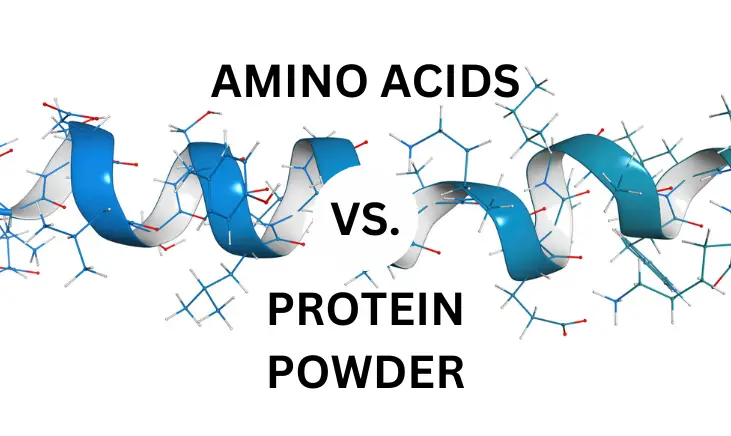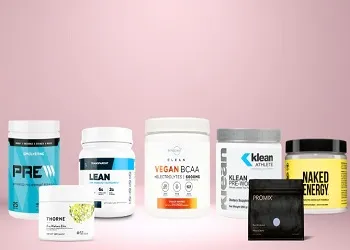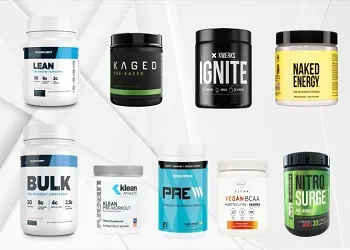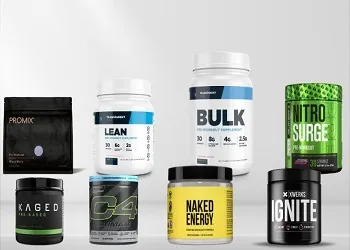A fairly common concern of those that are interested in using supplements to achieve maximum performance and health is whether you should use a high quaity amino acid supplement or a protein powder.
Which is better, is there any difference in the two, and what does muscle protein synthesis (MPS) have to do with it?
We’ll get to all of these points while discussing what considerations to make when deciding between amino acids vs protein powders.
As always, it’s best to talk to a nutrition or fitness professional when considering supplements so that they can help you tailor a sports nutrition regimen to achieve your specific goals.
Table of Contents
Key Points:
- Someone on a calorie-restricted diet may appreciate no or low-calorie amino acids supplements over calorie-dense protein powders.
- BCAAs will not lead to MPS alone but may aid in a faster recovery.
- A protein powder is a more comprehensive supplement for individuals looking to supplement for improved health.
The Case for Protein Powder
Because protein powder is a widely available supplement, consumers have many options at reasonable prices. Given its popularity, there are many brands, flavors, and formulas to choose from. Additionally, there is a plethora of research on protein powder, indicating the benefits of supplementation. Protein powder is also versatile, so, depending on your goals, you can use protein to gain weight, lose weight, or to focus on muscle building and repair.
Sources of Protein
Food Protein Sources
Healthy, nutritious, whole foods are a great source of quality protein. Lean meats like fish, chicken, and steak are all prime sources of complete proteins for meat eaters. For vegetarians, eggs and dairy products like milk and yogurt are perfect examples of non-meat protein sources. Plant-based sources are also important protein options like beans and pulses, nuts, seeds, tofu, and tempeh.
Whey and Casein Powders
Both animal-based protein powders, whey and casein, are derived from milk. Whey protein is the most researched and popular type of protein powder. However, choose what works best for you and whichever is easiest to digest without any issues.
Plant-based Powders
Protein can also be derived from plant sources like peas, rice, soy, and hemp. There are some additional considerations to have when choosing the best plant-based protein powder for your needs, but one can definitely supplement with a plant-based protein powder to consume all the essential amino acids needed to sustain and improve muscle growth.
The Case for Amino Acids
An amino acid supplement cuts right to the chase. They deliver amino acids in free-form rather than packaged in a protein powder for the body to digest.
Amino acids are the “building blocks of protein.” This is such a commonly used phrase because it creates important imagery about the role of amino acids in the body. Amino acids have different shapes and compositions in order to fit together perfectly to form proteins that build muscle tissue. This process isn’t exclusive to skeletal muscle tissue; the same process is happening in all your body’s structures.
When discussing aminos, we focus a lot on the nine essential amino acids, but there are eleven other amino acids that play important roles in the body. For example, sports science research has found benefits to other nonessential amino acids (NEAA) and conditionally essential amino acids (CEAA). For example, arginine, glutamine, citrulline, and beta-alanine all have individual uses and benefits when it comes to health and performance. Again, this all comes down to your goals and what you’re trying to achieve through supplementation.
Where do BCAAs Come In?
Branched-chain amino acids include three essential amino acids–leucine, isoleucine, and valine. Their chemical structure has a branched appearance, giving rise to the group’s name. These three BCAAs make up 17% of skeletal muscle, hence their popularity in the fitness world.
Leucine is the most acclaimed of the three due to its role in initiating muscle protein synthesis. This controlled trial found that leucine supplementation alongside a low dose of protein increased muscle protein anabolism in men.
The reason BCAAs aren’t enough when used alone is because you need all of the EAAs to complete MPS. BCAAs are great at stimulating protein synthesis, but, in order for the protein to actually be built, all EAAs and NEAAs must be present. It’s well documented that MPS can‘t commence without EAAs, but the body can produce NEAAs if necessary. So, if you’re deciding between BCAAs and EAAs, it is often more beneficial to go with EAAs to cover more bases.
Lean meats and animal products are good sources of BCAAs. Vegans and vegetarians may consider supplementing with BCAAs, especially if they are concerned with muscle growth, because BCAA doesn’t have an effect on muscle growth when taken alone.
BCAA Timing for Athletic Performance
When we talk about BCAAs, most of their benefits are related to recovery rather than actual muscle building. In this study, authors concluded that taking BCAAs before exercise may attenuate muscle damage, therefore reducing delayed onset muscle soreness (DOMS). Obviously, enabling a more effective recovery can indirectly lead someone to build muscle faster.
When to Take Protein Powders

Protein timing is a point of contention in the health and fitness industry. It’s much more important to focus on getting the right quality and quantity of protein rather than worrying about timing.
While timing isn’t the most important aspect of protein consumption, if you’re serious about optimizing your muscle-building capacity or are an athlete where small differences count, then you may want to consider adequately timing your protein powder supplement.
The anabolic window is the period of time when muscle protein synthesis takes place–in other words, when new muscle tissue is formed. There is research noting that consuming protein before or after exercise doesn’t matter for muscle metabolism outcomes. That said, most people prefer to have it after a workout, mainly for digestion; not everyone wants a chocolate supplement shake before intense exercise.
It is a good idea to consume protein and carbs post-workout to expedite the muscle recovery process and refuel your body. Having a pre-workout snack with carbs and protein is a good way to ensure you’re fueled for the work ahead. The bottom line is that both pre-workout and post-workout nutrition are important for maximizing the potential for muscle building and recovery.
Researchers have observed that dispersing protein intake in smaller amounts throughout the day instead of consuming all of your protein in one go is better for health. There is also evidence that says there may be benefits to consuming protein before sleep to facilitate MPS during sleep, specifically casein protein (20-40 grams).
How Much Protein to Take
The recommended dietary allowance (RDA) for protein is 0.8 grams/kg of body weight per day.
However, those who exercise frequently need more to aid in muscle function and recovery. The International Society of Sports Science Nutrition (ISSN) recommends consuming 20-40 grams of protein at once. You’ll notice that most protein powders are roughly this amount per serving, and some will go up to 30 or 40 grams. Heavier or more muscular individuals will require more protein.
For people who exercise, a more precise calculation is to multiply body weight in kilograms by 1.4-2.0 grams of protein. This total amount of protein is best consumed at different intervals in 20-40 gram doses throughout the day. A dose is roughly 0.25 grams of protein per kilogram of body weight.
Pros and Cons: Amino Acids Vs Protein Powder
Amino acid supplements are in free-form whereas protein must be digested and broken down into amino acids before they are utilized in the muscle. Does this faster absorption matter? Probably not.
Some protein powders can cause gastrointestinal discomfort. Oftentimes this is due to added ingredients like sweeteners and stabilizers. But some people may struggle more than others to digest protein powder, so they could turn to an amino acid supplement. That said, like most supplements, amino acid supplements are associated with a few potential side effects.
There has been concern about too much protein affecting the kidneys, but in recent years, that theory has been disproven. However, the growing evidence base around the gut microbiome points to too much protein may impact gut health, and as we learn more about this fascinating microbiome, we understand more and more that gut health impacts a myriad of health outcomes.
Go for Whole Foods
If you’re someone who eats a well-rounded diet full of quality protein sources, you don’t really need to supplement. The case for athletes is different: slight boosts in their sports nutrition regimen may have an impact when they are looking at such small training margins.
For the average person looking to support healthy aging by maintaining muscle mass, or for those looking to build muscle and gain strength, nature provides all the necessary amino acids to do so via food. Not all, but some individuals who eat a completely plant-based diet struggle to get enough complete protein through food alone;supplementing with protein or aminos can be beneficial in this respect.
There is definitely a role for supplements in health, but it’s vital to understand that supplements should never act as a replacement for whole foods.
Do I Need Amino Acids If I Take Protein? Can I Take Amino Acids Instead of Protein?
Even for those that aren’t heavy exercisers, our muscles are in a constant state of muscle protein turnover, and amino acids need to be supplied to muscles via the bloodstream in order to replace the proteins lost. When this doesn’t happen fast enough, muscle protein breakdown occurs. In order to build muscle, muscle protein synthesis must be happening at a faster rate than muscle protein breakdown.
In the case of assembling muscle proteins, our body doesn’t necessarily know the difference between amino acids that came from food, an amino acid supplement, or a protein powder.
Protein powders may have more additional ingredients like carbohydrates and fats. Depending on the ingredient list, you can use protein powder to accomplish a few different health needs.
Someone on a calorie-restricted diet may appreciate no or low-calorie amino acids supplements over calorie-dense protein powders. Whereas someone either trying to put on weight or use meal replacement smoothies for weight loss should definitely use a protein powder.
Conclusion: Amino Acids vs Protein Powder Supplements
Both an amino acid supplement and a protein powder can play an important role in your fitness journey. They are just two different tools to optimize your training and health.
For the most part, it’s a safe bet to use protein if you want to build muscle and don’t want to complicate things too much. If you’re seriously trying to cut calories, but still want to build muscle, amino acid supplements may be a better choice.
Frequently Asked Questions
Is it better to take amino acids or protein?
It depends on what you’re trying to achieve through supplementation. Protein will provide added vitamins, minerals, and calories that must be broken down into amino acids once in the body.
Should I take protein and amino acids?
Normally, it isn’t necessary to take both a protein and amino acid supplement. However, some people may want to take a specific amino acid instead of getting them all through protein. It really varies on a case-by-case basis. For most people, a complete protein source will provide all the amino acids needed.
Are amino acids the same as protein?
No, amino acids make up a protein.
Do amino acids build muscle or protein?
Amino acids form proteins that make up muscle tissue.














